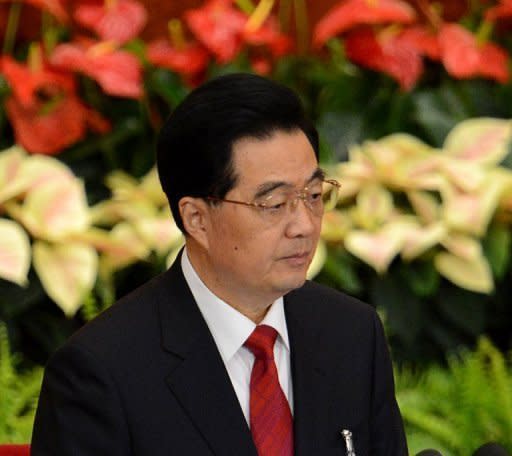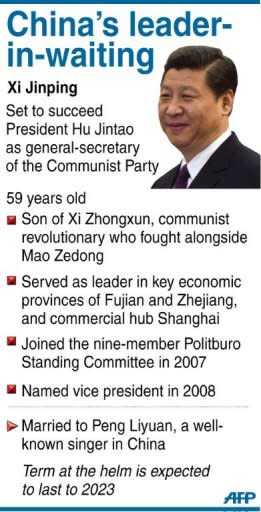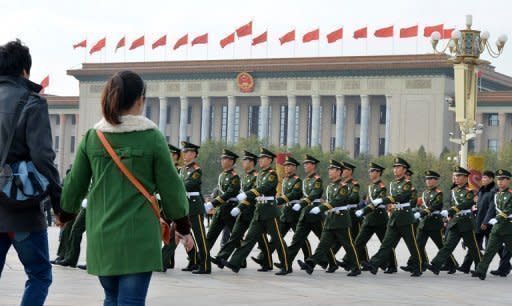China leader warns corruption could trigger 'collapse'
China's president Thursday warned the Communist Party faces "collapse" if it fails to clean up corruption and called for an economic revamp as he opened a congress to inaugurate a new slate of leaders. The week-long party congress will end with a transition of power to Vice President Xi Jinping, who will govern for the coming decade amid growing pressure for reform of the communist regime's iron-clad grip on power. The party's outgoing general-secretary, President Hu Jintao, delivered his starkest warning yet about fighting rampant corruption following a top-level murder and graft scandal involving former regional boss Bo Xilai. "If we fail to handle this issue well, it could prove fatal to the party and even cause the collapse of the party and the fall of the state," Hu told more than 2,200 delegates inside Beijing's cavernous Great Hall of the People. He also appeared to acknowledge growing pressure for reform by saying the party must change China's "political structure and make the people's democracy more extensive". At the congress, which is held every five years, Hu also positioned the world's second-largest economy for a more assertive role as he insisted China should be a "maritime power" that "resolutely" protects its interests. The comment prompted Tokyo to call on Beijing to use its growing power in a "peaceful manner based on international law". Heading into the 18th party congress, China has been skirmishing with Japan and other Asian neighbours over a slew of territorial disputes and flexing its growing military muscles, to the disquiet of the United States. Referring to corruption, but without naming Bo, the president added that the party "must make sure that all are equal before the law". There was more embarrassment in the lead-up to the congress with a New York Times report last month that said the family of premier Wen Jiabao had amassed $2.7 billion in "hidden riches". And in June, business news agency Bloomberg published an investigation into the finances of Xi's extended family which it said totalled $376 million, although there was no indication of wrongdoing. Leaders, Hu said, must exercise self-discipline and "supervision over their family and staff and they should never seek any privilege". Observers said that despite Hu's frank admissions, prospects for substantive reform in a hidebound political system were remote. "The language is surprisingly strong but in terms of us seeing new action, it is doubtful," said analyst Willy Lam of the Chinese University of Hong Kong, noting that past proclamations had yielded little change. "It is very difficult to solve corruption because it has become an endemic problem. Everyone is doing it, all the main (political) families," he said. "So it is almost mission impossible." Hu's call for political reform also contrasted with the treatment meted out to would-be protesters outside the Great Hall of the People on Tiananmen Square. An AFP reporter saw two elderly women hustled away from the vast esplanade as they attempted to present petitions -- in a long-standing tradition by which ordinary citizens protest wrongdoing including corruption and abuse of power. In a metro station near the square, another group of up to 30 petitioners were surrounded and taken away by bus. Hundreds of activists have been put under house arrest in the lead up to the congress, rights groups say, while Beijing taxi drivers have even been told to lock their back windows -- apparently to prevent passengers from throwing out flyers carrying political messages. Meanwhile, the Tibetan government in exile in India said six Tibetans had set themselves on fire in China since Wednesday in an unprecedented string of self-immolation protests against Chinese rule. It was not immediately clear whether the immolation surge -- individual incidents have taken place regularly since March 2001 -- was timed for the congress. On China's wildly popular social media websites, search terms related to the congress were censored but a few caustic responses to Hu's speech got through. "What a joke. My high school essays were better than that!" one posting said. Hu said the secretive party faced "risks and challenges unknown before", an apparent reference to the uphill task it faces staying relevant in an increasingly open world. In his 90-minute address, Hu also stressed that China must recalibrate its export- and investment-led growth model, as experts warn its breakneck expansion is unsustainable. He said the rough global seas make it necessary for China to "speed up the creation of a new growth model" that includes greater domestic consumption as a growth driver. Communist leaders have long been calling for China to rebalance its economy by fostering domestic consumer spending. That would help redress China's swollen trade surpluses, which have been an irritant to the West for years and cast the country as the foreign bogeyman of the just-concluded US presidential campaign. The congress will end next week with the installation of Xi as the party's new general-secretary, and he is in line to succeed Hu as state president next March. But Xi, the son of a revolutionary hero who has been Hu's heir apparent since 2007, will take over at a challenging time given the rare economic slowdown, and amid demands for change from the country's vocal web users. A state-run newspaper published a survey Wednesday suggesting eight out of 10 Chinese in major cities want political reform of some sort. The contrast with how the United States manages its political affairs was laid bare with President Barack Obama's re-election triumph, and did not go unnoticed among commentators on China's "weibo" chat sites. Behind closed doors, Communist Party leaders appear to have settled on the new line-up of the Politburo Standing Committee, China's highest decision-making body, which will be unveiled when the congress ends on November 14. The committee will be steered by Xi, 59, who has previously headed some of China's most economically dynamic and reform-minded areas. But in the opaque communist system, little is known about his personality or policy inclinations.





